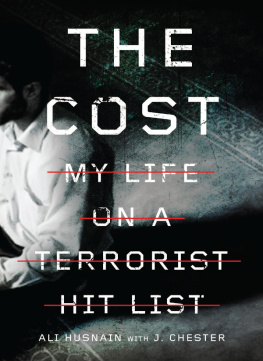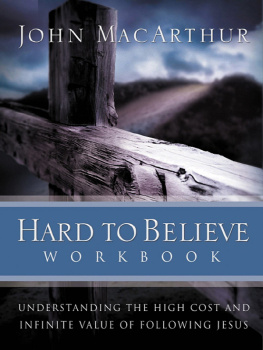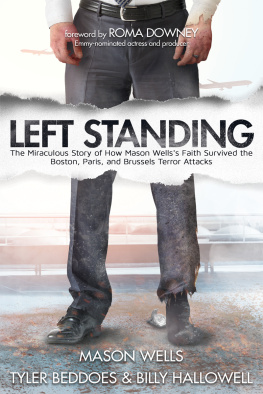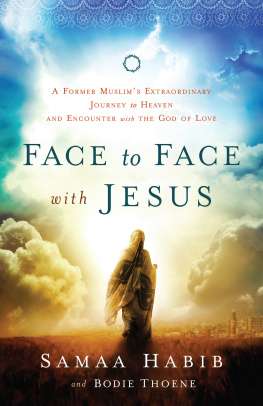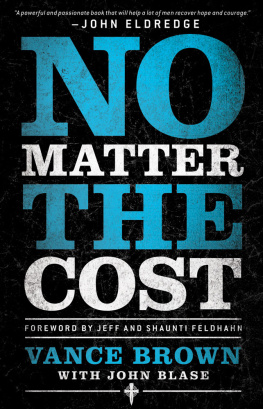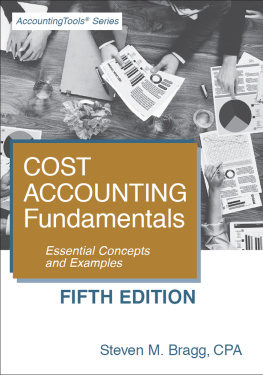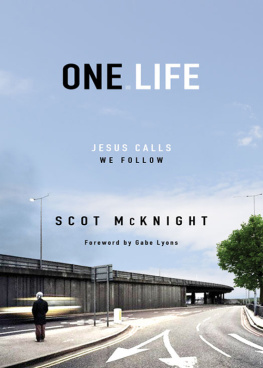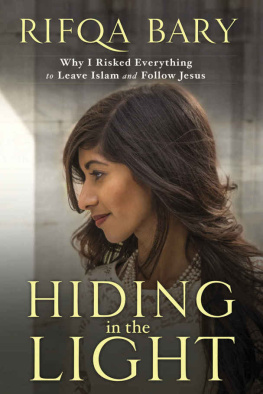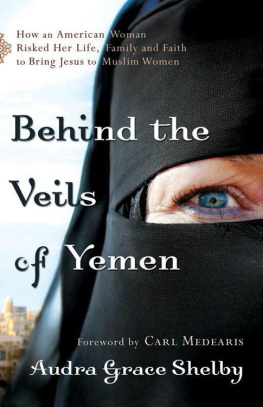ZONDERVAN
The Cost
Copyright 2016 by Husnain Ali
Requests for information should be addressed to:
Zondervan, 3900 Sparks Dr. SE, Grand Rapids, Michigan 49546
ePub Edition January 2016: ISBN 978-0-310-34487-2
Library of Congress Cataloging-in-Publication Data
Names: Husnain, Ali.
Title: The cost : my life on a terrorist hit list / Ali Husnain, with J. Chester.
Description: Grand Rapids : Zondervan, 2016.
Identifiers: LCCN 2015036830| ISBN 9780310344865 (hardcover) | ISBN 9780310344889 (softcover) | ISBN 9780310344872 (ebook) | ISBN 9780310066545 (mobile app)
Subjects: LCSH: Husnain, Ali. | Christian biographyPakistan. | TerrorismReligious aspectsChristianity.
Classification: LCC BR1725.H857 A3 2016 | DDC 275.491/083092dc23 LC record available at http://lccn.loc.gov/2015036830
Scripture quotations are taken from the Holy Bible, New International Version, NIV. Copyright 1973, 1978, 1984, 2011 by Biblica, Inc. Used by permission of Zondervan. All rights reserved worldwide. www.zondervan.com. The NIV and New International Version are trademarks registered in the United States Patent and Trademark Office by Biblica, Inc.
Any Internet addresses (websites, blogs, etc.) and telephone numbers in this book are offered as a resource. They are not intended in any way to be or imply an endorsement by Zondervan, nor does Zondervan vouch for the content of these sites and numbers for the life of this book.
All rights reserved. No part of this publication may be reproduced, stored in a retrieval system, or transmitted in any form or by any meanselectronic, mechanical, photocopy, recording, or any otherexcept for brief quotations in printed reviews, without the prior permission of the publisher.
Published in association with the literary agency of D.C. Jacobson and Associates LLC, an Author Management Company, www.dcjacobson.com.
Cover design: Brian Bobel @ Dual Identity
Cover photo: iStockphoto
Interior design: Kait Lamphere
First printing January 2016
To protect their privacy, the names of most people in this book have been changed.Dialogue has been recreated from my best memories, and the statements and actionsof any people in this book are not to be construed as the statements and actionsof people who bear the same names.
To my aunt Gulshan,
for all your hard work and prayers
CONTENTS
Thanks to Gordon and Rachel, Tim, Terry and Ann, Peter, and all the other peoplewho have helped me over the years. You have been my brothers and sisters and I ammore grateful than words can express.
Thank you to the wonderful team at Zondervan for being prepared to partner with meon this book.
I had just turned seventeen, and nothing could have prepared me for how dangerousmy life had become.
Three months had passed since the air had filled with angry shouts of Kafir! Infidel!and an army of hands of those I thought were my friends had forced me to the dustyground, pinning me tight. Three months since I watched the black-robed mullah marchup to me, a knife as long as my hand catching the late-afternoon sun. Three monthssince I felt the blade pierce my skin and drive deep between my ribs. Three monthsand still it hurt when I tried to use my left arm. Externally the only evidence ofthe stabbing was a thick scar as wide as my thumb, but the deep pain inside my chestwas as fierce as ever. Still, it was nothing compared with the fear.
Being scarred was nothing compared with being scared.
My stomach remained permanently twisted, my breath constantly short, my muscles readyto send me running for cover at a moments notice. In the weeks following that initialattack, as events unfolded and my life sank deeper and deeper into this suffocatingquicksand I was in, the fear had only gotten worse. My appetite had decreased, whatlittle sleep Id been able to get before had all but vanished, and the ability tofind within me a moment of stillness and calm had deserted me. All Id been ableto feel, all Id been able to taste, all Id been able to know, was fear.
In three months I had gone from being a confident young man who was starting to puthis plan for his life into play, to this: a wounded boy who was afraid of the darkand desperate for his mother to come and take care of him. It wasnt a change infortune that Id been expecting. Anyone who knew me before the assault would havebeen shocked to see me in such a terrible state.
In Pakistan you can tell a lot about a person from their name. Family names carrygreat significance and are an instant way of revealing a persons breeding and socialstanding. And mine was about as prestigious as that of anyone Id ever met.
My name is Ali Sayed Husnain Shah. It is a name conveying unmistakable high birth,with a family tree that stretches all the way back to the birth of Islam and Muhammadhimself.
Ali is the name of the man who married Muhammads first child and the very man whowent on to be Muhammads first-ever disciple and founder of the branch of IslamShiatowhich my family belongs. People called Shah are also members of a highly respectedcaste, and Shahs are often found in the highest levels of society, from businessto government.
But it is the name Sayed that really counts. We Sayeds are members of the highestcaste in the land, attending the best universities, dispensing wisdom to our communities,and often living off the generosity of our disciples. Ours is a life of privilege,and privilege was the kind of life I had come to know. I was a young man on the rise,honored everywhere I went, whether the mosque or the country club. Yet none of thatmattered now. Now I was living in a shack. A prince turned into an outcast.
My mother, Ami, hadnt visited me during the weeks I had spent in the shack. It wastoo dangerous. I understood that, but it hadnt stopped my tears, and I was alwayscareful to muffle my crying with the solitary stained blanket Id found beneaththe bed.
But today, finally, I was leaving my little prison.
When Baba-jan, my stepfather, stepped carefully out of his dusty SUV, my little brother,Misim, ran toward me as if his life depended on it. For minutes we did not say anything;we just embraced at first and sat side by side, his little hand in mine, as silencestretched between us. It was the best kind of silence.
It did not take long for Baba-jan to gather up my possessions and load them intothe car, and while he did, Misim and I sat in the car and took in the view. The buildingId been sleeping in for the last month was old and broken. Poorly fashioned bricksmade up walls that looked as though they had been laid by an impatient child. Thesheets of metal on the roof were rusted and choked with vines that reached out acrossthe small clearing in the forest. With tall trees all around and too little sunlightfiltering down, it looked more like a grave than the safe house it was meant to be.
I closed my eyes, waiting for Baba-jan to finish up inside the shack. Nomi, saidMisim, calling me by the nickname given to many a clever kid in Pakistan. Everyonehad called me that when I was younger, and feeling Misim squeezing my hand gentlyas he spoke, I remembered what my life felt like before everything changed. Baba-janwanted to bring the Honda, but I told him to bring the Range Rover, see? I knew youdlike it better.
That is good, Misim, I said, smiling and arching my back into the leather seatsto show my appreciation. Thank you. I looked at him. He had grown since I lastsaw him, and the first wisps of a mustache were appearing on his lip. His smile hadntchanged a bit, though. It was the same grin he wore whenever I took him to UncleFaizals arcade and gave him a handful of rupees to play video games, the same onethat remained pasted all across his face whenever I let him ride on the front ofmy motorbike as we circled around the streets. But the smile vanished as soon asI spoke again. Where is everyone else, Misim? I wanted to see my sister, Zainab.I wanted to see Ami.
Next page
